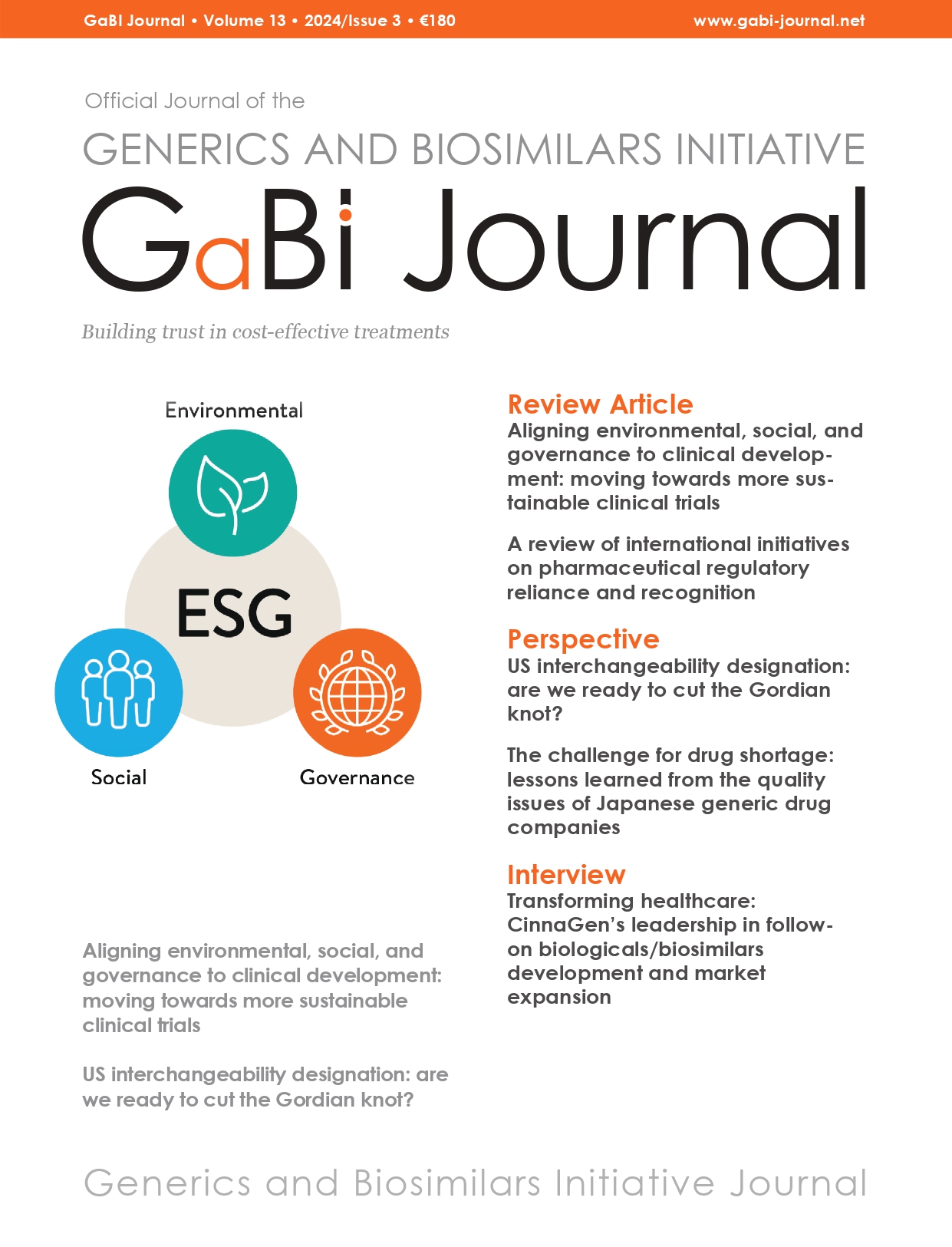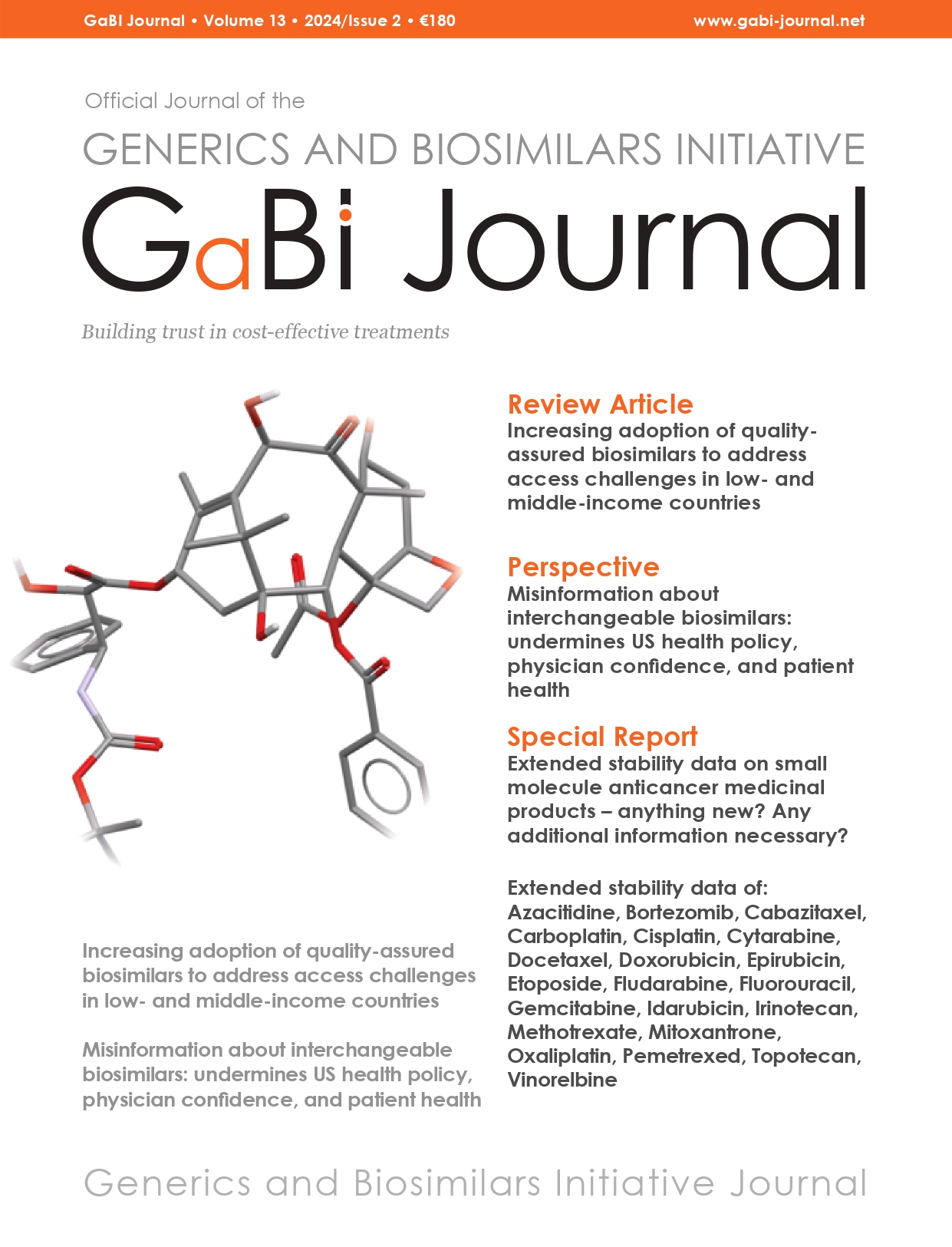Nomenclature for biosimilars; a continuing thorny issue
Published on 2012/05/08
Generics and Biosimilars Initiative Journal (GaBI Journal). 2018;7(4):141.
|
Abstract: |
Submitted: 1 January 2019; Revised: 3 January 2019; Accepted: 3 January 2019; Published online first: 8 January 2019
Nomenclature for pharmaceuticals is often regarded as uninteresting and boring. Recently, however, nomenclature for biological products and especially biosimilars has raised controversial issues resulting in divergence of opinions, argument, lobbying of stakeholders and heated debate previously unheard of in the nomenclature field.
It is clearly essential that all biological products can be identified by a unique name. This applies to biosimilars as well as ‘originator’ products and is particularly important for prescribing, product traceability, and pharmacovigilance (the latter is sometimes referred to as ‘post-marketing surveillance’).
What is less agreed upon is the best way of achieving this, and this is where most controversy and disagreement focuses.
The nomenclature for biosimilars issue is considered in the manuscript ‘The need for distinct nomenclature for originator and biosimilar products’ authored by Michael Sarshad, Rosanne Campbell, Peter Pitts and Jacqueline Vanderpuye-Orgle, in this issue of GaBI Journal.
The Sarshad et al. paper [1] correctly asserts that biosimilars are now a growing class of biological products and that accurate pharmacovigilance data will be increasingly important. The views put forward in the paper are US biased, as would be expected from the author’s declared affiliations.
The paper cautions the reader that how biosimilars are named has become complex and inconsistent globally. It then goes on to describe the US Food and Drug Administration’s (FDA) recently published final guidance on nomenclature for biologicals. Put simply, this states that a distinct, four-letter suffix should be added to the International Nonproprietary Name (INN) to create a unique name for each biological (which includes biosimilars).
The paper goes on to consider some previously proposed potential disadvantages of the US FDA system, primarily that it will cause ‘confusion for prescribers and will create an artificial barrier inhibiting prescribing’. It then concludes from data from a literature review that this will not happen.
This is reassuring, but needs to be considered with caution.
The paper seems to ignore the fact that a well-tried and tested nomenclature system which positively identifies products is already available in the form of trade names. These are unique identifiers, that go through an assessment process for suitability, and have been widely used in pharmacovigilance. If the legal issue that manufacturers are not forced to apply for a trade name could be circumvented, their use would solve the issues with availability of unique identifiers for biosimilars and all pharmaceuticals.
The paper does not consider some additional disadvantages of the US FDA scheme. The FDA system is not used outside the US and is unlikely to be adopted by most other regulatory agencies. It does not, therefore, solve the ‘inconsistency in nomenclature issue’ noted by the authors. In fact, very different approaches for naming biosimilars have been adopted by other large regulatory agencies, such as the European Medicines Agency (EMA) and the Therapeutics Goods Administration (TGA) of Australia.
The system ‘adulterates’ the INN system, which has been in place ‘unadulterated’ for over half a century. INNs are established by the World Health Organization (WHO), and identify the active ingredient of several classes of pharmaceuticals including many types of biologicals. But they do not identify individual biological products which are based on the same molecule. They therefore do not per se distinguish between originator and biosimilar products. INNs are public property and should not be modified from the form established by WHO. The US FDA system clearly disregards this principal, which is confusing and potentially misleading.
The four letter subscript in the US FDA name is instantly forgettable, difficult to remember accurately, and potentially prone to pronunciation and transcription errors. The fact that it starts with the entire INN clearly makes it look and sound like an INN, which it is not. This again is a cause for confusion and concern.
The system effectively inserts an additional layer of nomenclature between the (real) INN and trade names. This makes an already fairly cumbersome (and sometimes considered over complex) area more unwieldy and confusing, particularly as there seems to be no real difference in the uses/purposes of trade names and the US FDA new names.
The Sarshad et al. paper presents some very interesting information on an area which needs further consideration. But the new US FDA nomenclature system which it promotes is not the global or even perhaps regional answer to the issue of nomenclature for biosimilars.
Competing interests: None.
Provenance and peer review: Commissioned; internally peer reviewed.
Reference
1. Sarshad M, Campbell R, Pitts PJ; Vanderpuye-Orgle J. The need for distinct nomenclature for originator and biosimilar products. Generics and Biosimilars Initiative Journal (GaBI Journal). 2018;7(4):152-7. doi:10.5639/gabij.2018.0704.031
|
Author: Robin Thorpe, PhD, FRCPath, Deputy Editor-in-Chief, GaBI Journal |
Disclosure of Conflict of Interest Statement is available upon request.
Copyright © 2018 Pro Pharma Communications International
Permission granted to reproduce for personal and non-commercial use only. All other reproduction, copy or reprinting of all or part of any ‘Content’ found on this website is strictly prohibited without the prior consent of the publisher. Contact the publisher to obtain permission before redistributing.


